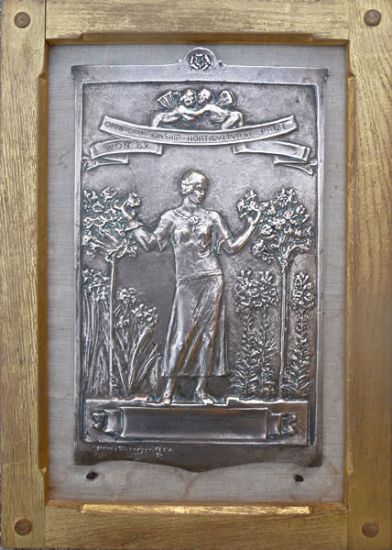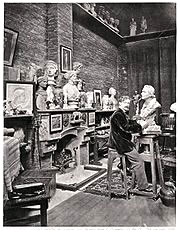
 SOLD
SOLD
Sir William Hamo Thornycroft:
Open Championship Horticultural Prize, 1921
Framed (ref: 2925)
Signed and dated
Bronze, 11 1/2 x 6 3/4 in. (29 x 17 cm.)
Tags: Sir William Hamo Thornycroft bronze flowers leisure women
In a gilded oak peg jointed frame on a linen groundTowards the end of the First World War, many sculptors, even
those with an established reputation such as Thornycroft, were
struggling to find
work. Even with the initiative of War Memorials, the end of the war,
it took some time before projects came through. Thornycroft's diaries
for the time state that
he was reduced to commissions for small plaques and personal memorials,
but no details of Toogoods are given. How Thornycroft came to be
commissioned by Toogoods has yet to be
establish. His brother had a farm on the Isle of Wight, so he may well
have been a customer of Toogoods and the connection may have been as a
result of this.

From 1882-1914 taught at R.A. Schools and received many public
commissions including memorial to Gladstone, Strand; General Charles
Gordon; and Oliver Cromwell, Westminster. Also executed a frieze for
Institute of Chartered Accountants building, London. R.B.S. Gold Medal,
1923; joint memorial exhibition with F. Derwent Wood at R.A. 1927.
A.R.A. 1881, R.A. 1888, Knighted 1917
Toogoods was started in the early nineteenth century and by
the early twentieth century had become, probably, the largest seed
company in the UK. Not only did they supply the royal parks, but also
held contracts to supply a number of colonial governments. Their
premises in Southampton was located beside a rail and port terminal,
ideally placed for transporting seeds.
In the early 1900s, the
company invested heavily in technology and their advertising literature
focused heavily on their "modern" sorting and selection rooms and the
science that was employed in developing high yielding strains. The
company was quite adept at marketing and used, for example,
photomontages in which an animal was photographed, reduced in scale,
and positioned in front of mangles, so making the crop look larger. To
modern eyes dishonest, but also amusing.
The company
commissioned a series of medals and prizes. The earliest date back to
the 1890s. Gold, silver and bronze medals were produced. Each year,
organisers of horticultural shows were contacted and offered a
selection of these medals for free. The medals could be awarded to show
participants, but only those who had grown their plants using Toogoods
seeds. These medals are of very high quality and the rarer Thornycroft
plaques appear to be part of the same scheme.
We are grateful to Mark Clements for assistance.








